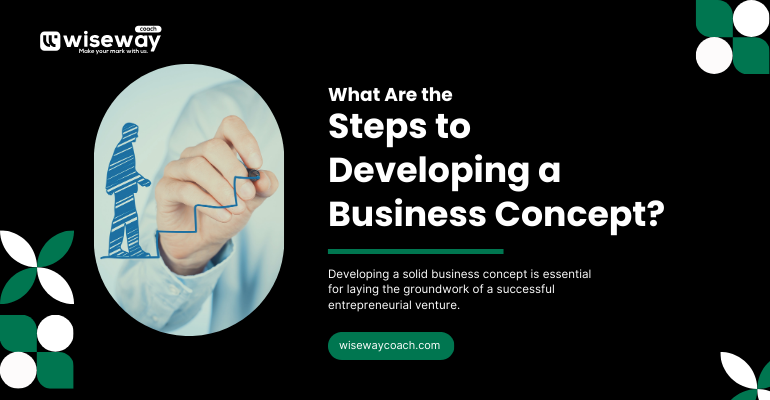What Are the Steps to Developing a Business Concept?
September 18, 2024 2024-09-17 15:55What Are the Steps to Developing a Business Concept?
Developing a solid business concept is essential for laying the groundwork of a successful entrepreneurial venture. A well-crafted concept not only helps in identifying market needs but also in setting clear goals and creating a roadmap for transforming your idea into a viable business. Here’s a step-by-step guide to help you develop a robust business concept that paves the way for long-term success.
1. Identify a Market Need
Conduct Market Research
The first step in developing a business concept is identifying a market need. This involves conducting thorough market research to understand current trends, consumer behaviors, and gaps in the market. Gathering data through surveys, interviews, and industry reports will provide insights into potential customer needs and preferences. With this information, you can pinpoint areas where there is demand for new or improved products or services.
Define Your Target Audience
Defining your target audience is also crucial. Consider demographics, psychographics, and purchasing behaviors to tailor your business concept to meet their specific needs and preferences. Understanding who your potential customers are and what they want will help you focus your efforts on creating a product or service that resonates with them.
2. Brainstorm and Refine Your Idea
Generate Business Ideas
Once you have a clear understanding of the market need and target audience, the next step is to brainstorm and refine your idea. Generate a range of business ideas that address the identified needs, encouraging creativity and exploring various approaches and solutions. This phase is about thinking outside the box and considering different ways to address the market gap.
Evaluate and Refine
Evaluate the feasibility and potential of each idea by considering factors such as market size, competition, and profitability. Refine your ideas by focusing on the most promising ones that align with your strengths, resources, and market opportunities. Narrowing down to the most viable concept will help you create a focused plan for your business.
3. Develop a Unique Value Proposition
Define Your Value Proposition
A unique value proposition (UVP) is a statement that clearly articulates the benefits and value your business offers, distinguishing it from competitors. Define what makes your offering unique and how it addresses the needs and pain points of your target audience. Your UVP should communicate why customers should choose your product or service over others in the market.
Test and Validate
To validate your UVP, seek feedback from potential customers, industry experts, and mentors. Use surveys, focus groups, and prototype testing to gather insights on how well your value proposition resonates with your target audience. Make adjustments based on feedback to ensure your UVP effectively communicates your business’s unique advantages.
4. Create a Business Model
Choose a Business Model
Develop a business model that outlines how your business will operate and generate revenue. Consider different models such as subscription-based, freemium, direct sales, or licensing. Choose a model that aligns with your concept and is scalable and sustainable in the long term. Your business model will be a key factor in determining how you create, deliver, and capture value.
Outline Key Components
Include key components in your business model such as revenue streams, cost structure, key activities, resources, and customer segments. Creating a detailed plan that outlines these elements will serve as a blueprint for your business operations and financial strategy.
5. Conduct a SWOT Analysis
Analyze Strengths and Weaknesses
Conduct a SWOT analysis to assess the strengths and weaknesses of your business concept. Identify internal factors that could impact your success, such as your skills, resources, and operational capabilities. Understanding your strengths and weaknesses will help you leverage your advantages and address potential challenges.
Assess Opportunities and Threats
Evaluate external factors that could affect your business, including market trends, competition, and economic conditions. Identify opportunities for growth and potential threats to your business. Use this analysis to develop strategies for capitalizing on opportunities and mitigating risks.
6. Develop a Business Plan
Outline Your Plan
A comprehensive business plan is crucial for turning your concept into reality. Outline your business goals, target market, value proposition, business model, marketing strategy, and financial projections. Include details on your operational plan, organizational structure, and growth strategy. This plan will guide your business and serve as a tool for securing funding and managing your operations.
Seek Feedback and Revise
Share your business plan with mentors, advisors, and potential investors to gather feedback. Use their insights to refine and improve your plan. A well-prepared business plan not only clarifies your vision and strategy but also demonstrates your commitment and readiness to potential stakeholders.
7. Test Your Concept
Create a Minimum Viable Product (MVP)
Develop a minimum viable product (MVP) or prototype to test your business concept in the market. An MVP is a simplified version of your product or service that allows you to gather feedback and validate your concept with real customers. Use this feedback to make improvements and refine your offering.
Pilot and Iterate
Conduct a pilot test or soft launch to further evaluate your concept’s viability. Monitor performance, gather customer feedback, and make necessary adjustments based on your findings. Iterating on your concept based on real-world data helps you refine your product or service and increase its chances of success.
8. Launch and Scale
Prepare for Launch
Once you’ve validated and refined your business concept, prepare for a full launch. Develop a marketing and sales strategy to promote your product or service, build brand awareness, and attract customers. Ensure that your operations, supply chain, and customer service are ready to support your launch.
Focus on Scaling
After a successful launch, focus on scaling your business. Identify opportunities for growth, such as expanding your product line, entering new markets, or increasing your customer base. Continuously monitor performance, adapt to market changes, and invest in strategies that drive sustainable growth.
Conclusion
Developing a strong business concept involves several critical steps, including identifying market needs, brainstorming and refining ideas, creating a unique value proposition, and developing a viable business model. Conducting a SWOT analysis, crafting a detailed business plan, testing your concept, and preparing for launch are essential for turning your idea into a successful venture. By following these steps, you can build a solid foundation for your business and position yourself for long-term success.



